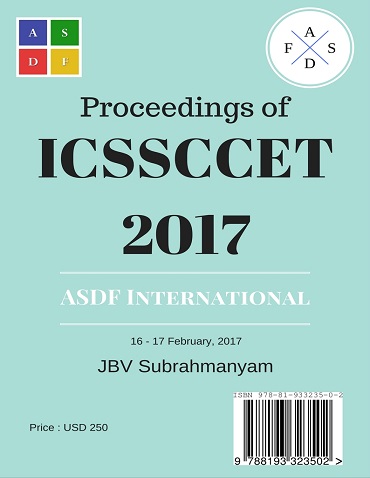- Publication Meta:Value
- Short Title:ICSSCCET 2017
- Publisher:ASDF, India
- ISBN 13:978-81-933235-0-2
- ISBN 10:81-933235-0-5
- Language:English
- Type:Hard Bound - Printed Book
- Copyrights:ICSSCCET Organizers / DCRC, London, UK
- Editor-in-Chief:Dr JBV Subrahmanyam
- Conference Dates:16 - 17, February 2017
- Venue Country:Hyderabad, India
- Submitted Papers:412
- Acceptance Rate:8.05%
- Website:www.icssccet.org
Welcome to ASDF Electronic Digital Library!
ICSSCCET 2017
ICSSCCET 2017
International Conference on Systems, Science, Control, Communication, Engineering and Technology 2017
Paper 053
A Study on Bituminous Mix Properties Using Waste Polyethylene
CH Krishnareddy1, A Swetha2
1Assistant Professor, TKR Engineering College Hyderabad, India
2Assistant Professor, TKR Engineering College & Technology, Hyderabad, India
Abstract
Bituminous mixes are most commonly used all over the world in flexible pavement construction. It consists of asphalt or bitumen (used as a binder) and mineral aggregate which are mixed together, laid down in layers and then compacted. Under normal circumstances, conventional bituminous pavements if designed and executed properly perform quite satisfactorily but the performance of bituminous mixes is very poor under various situations. Today's asphaltic concrete pavements are expected to perform better as they are experiencing increased volume of traffic, increased loads and increased variations in daily or seasonal temperature over what has been experienced in the past. In addition, the performance of bituminous pavements is found to be very poor in moisture induced situations. Plastics are everywhere in today's lifestyle and are growing rapidly throughout particularly in a developing country like India. As these are non–biodegradable there is a major problem posed to the society with regard to the management of these solid wastes. Low density polyethylene (LDPE) has been found to be a good modifier of bitumen. Even, the reclaimed polyethylene originally made of LDPE has been observed to modify bitumen. In the present study, an attempt has been made to use reclaimed polyethylene which has been obtained from plastic packets used in packaging of a very popular brand of milk named AMUL, in dry form with the aggregates like a fibre in a bituminous mix. Detailed study on the effects of these locally waste polyethylene on engineering properties of Bituminous concrete (BC), Dense Bituminous macadam (DBM) and Stone mastic asphalt (SMA) mixes, has been made in this study.
Keywords
Author's Profile
Author profile can be generated and linked through our partners World Book of Researchers. To include your profile online Click Here. After it is approved, please email to edlib @ asdf.res.in to create a link with all the papers.
e-AID
ICSSCCET.2017.053
Cite this Article as Follows
CH Krishnareddy, A Swetha. "A Study on Bituminous Mix Properties Using Waste Polyethylene" International Conference on Systems, Science, Control, Communication, Engineering and Technology (2017): 27. Print.
© 2010 - by EDLIB .
All Rights Reserved.

